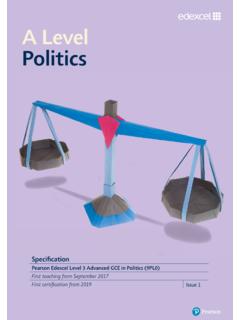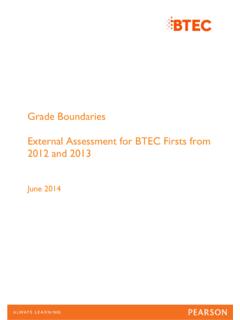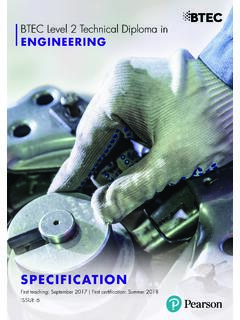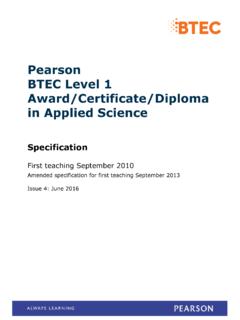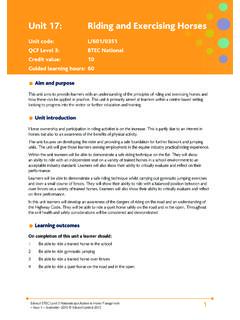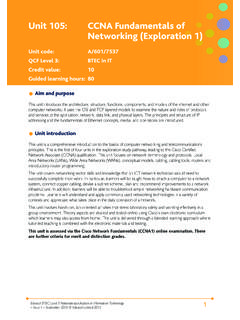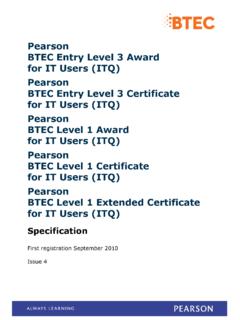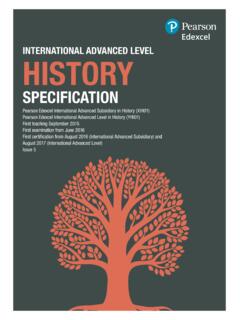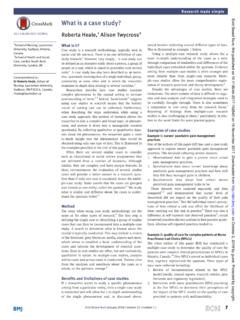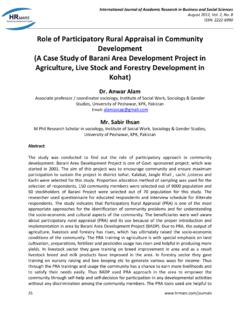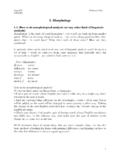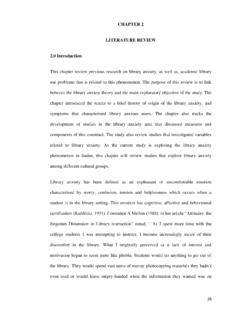Transcription of Unit 4: Research Methods for Sport and Exercise Sciences
1 Unit 4: Research Methods for Sport and Exercise Sciences Unit code: M/600/0041. QCF Level 3: BTEC National Credit value: 10. Guided learning hours: 60. Aim and purpose The aim of this unit is to enable learners to explore data collection analysis techniques, the Research process and the way in which Research can be applied in a Sport and Exercise context. Unit introduction In recent years, there has been a rapid growth in the level of academic interest that the domains of Sport ', Exercise ' and health' have attracted. Sport and Exercise scientists have played a key role in the development of this interest, their work is used in numerous areas including sports performance, Exercise adherence and the health of the nation. Research is the collection and analysis of data. Sport and Exercise scientists need to know how to collect and analyse data effectively for their Research to have value; therefore, it is essential that they have knowledge and understanding of the appropriate Research Methods for each given situation.
2 Learners will start this unit by looking at the key issues in Research Methods . From this base, learners will progress to acquiring key skills in both qualitative and quantitative Research . These skills will be used later in the unit through the application of data collection and data analysis techniques to practical situations, allowing learning through doing'. The emphasis of the unit, in the latter stages, will be around the practising and refining of Research skills. As with other skills, Research skills need to be practised in order for learners to use them autonomously, and learners will be given the opportunity to practise in a number of laboratory and field-based settings. Throughout the unit, learners will have the opportunity to build information technology into their work and will be expected to develop appropriate information technology skills to prepare for the Research project. This unit is intended to prepare learners for the vocational roles that Sport and Exercise scientists fulfil.
3 Learning outcomes On completion of this unit a learner should: 1 Know key issues in Research Methods for the Sport and Exercise Sciences 2 Know data collection techniques for the Sport and Exercise Sciences 3 Know qualitative data analysis techniques for the Sport and Exercise Sciences 4 Know quantitative data analysis techniques for the Sport and Exercise Sciences . Edexcel BTEC Level 3 Nationals specification in Sport and Exercise Sciences Issue 1 January 2010 Edexcel Limited 2009. 1. Unit content 1 Know key issues in Research Methods for the Sport and Exercise Sciences Research : quantitative Research , eg generally deductive, designed to establish differences, relationships or causality; qualitative Research , eg generally inductive, designed to explain differences, relationships or causality Key issues: validity; reliability; accuracy; precision 2 Know data collection techniques for the Sport and Exercise Sciences Types of data: primary; secondary Qualitative techniques: interviews, eg transcribing interviews, interview techniques; focus groups, eg transcribing focus groups; observation, eg participant observation and non-participant observation, recording observational data; benefits and limitations of each type of data collection method Quantitative techniques: questionnaires, eg types of questionnaire, questionnaire design; laboratory-based data collection; field-based data collection.
4 Benefits and limitations of each type of data collection method Classifications of data: discrete; ordinal; continuous; interval; ratio Research designs: eg experimental, cross-sectional, case study, longitudinal, comparative Ethical and legal issues in Research : British Association of Sport and Exercise Sciences (BASES) code of conduct, eg ethical clearance, informed consent, confidentiality, data protection, safety of the participants, acting with due regard for equality and impartiality; importance of ethical and legal issues, eg ensure the welfare and safety of participants and the researcher, ensure that researchers only work within area of expertise, preserving and developing the reputation of the Sport and Exercise Sciences ; implications of not working within ethical and legal guidelines, eg tribunals, legal or civil action, measures to stop future Research 3 Know qualitative data analysis techniques for the Sport and Exercise Sciences Stages of data analysis: data reduction (coding open coding, axial coding, selective coding); other techniques, eg non-numerical unstructured data indexing, searching and theorising (NUD*IST, ATLAS/ti).
5 Displaying data, eg network diagrams, venn diagrams, radial diagrams, cycle diagrams; drawing conclusions and verifying data, eg triangulation, member checking 4 Know quantitative data analysis techniques for the Sport and Exercise Sciences Data analysis: parametric tests, eg ANOVA, t-tests, MANOVA, Pearson Product Moment Correlation Coefficient (r); non-parametric tests, eg Wilcoxen matched pairs signed ranks test, Chi Squared, Mann Whitney U, Spearman rank-order correlation; explanations of tests; selecting tests; degrees of freedom;. ICT-based techniques, eg Statistical Package for Social Sciences (SPSS), Microsoft Excel Organising data: eg range, rank order distribution, simple frequency distribution, grouped frequency distribution Displaying data: eg graphs, histograms, bar charts, cumulative frequency graphs, normal distribution, positively skewed curves, negatively skewed curves Measures of central tendency and variability: eg mean, median, mode, identification of outliers, standard deviation Edexcel BTEC Level 3 Nationals specification in Sport and Exercise Sciences 2 Issue 1 January 2010 Edexcel Limited 2009.
6 Assessment and grading criteria In order to pass this unit, the evidence that the learner presents for assessment needs to demonstrate that they can meet all the learning outcomes for the unit. The assessment criteria for a pass grade describe the level of achievement required to pass this unit. Assessment and grading criteria To achieve a pass grade the To achieve a merit grade the To achieve a distinction grade evidence must show that the evidence must show that, in the evidence must show that, learner is able to: addition to the pass criteria, in addition to the pass and the learner is able to: merit criteria, the learner is able to: P1 describe qualitative and quantitative Research P2 identify key issues that M1 explain key issues that affect D1 analyse key issues that affect Research in Sport and Research in Sport and Exercise affect Research in Sport and Exercise Sciences Sciences Exercise Sciences [IE2, IE4, IE5, IE6]. P3 outline the types, techniques, and classifications of data that are common in Research in the Sport and Exercise Sciences P4 describe two ethical and M2 explain the implications of D2 analyse the implications of legal issues associated with not working both ethically not working both ethically Research in Sport and Exercise and legally when conducting and legally when conducting Sciences Research in the Sport and Research in the Sport and [IE3, IE4, IE5] Exercise Sciences Exercise Sciences .
7 P5 describe the three main M3 justify, for a selected stages of qualitative data Research -based example, the analysis in the Sport and most appropriate Research Exercise Sciences design and techniques for qualitative data collection and data analysis P6 describe two contrasting M4 justify, for a selected quantitative data analysis Research -based example, the techniques used in the Sport most appropriate Research and Exercise Sciences . design and techniques for quantitative data collection and data analysis. PLTS: This summary references where applicable, in the square brackets, the elements of the personal, learning and thinking skills applicable in the pass criteria. It identifies opportunities for learners to demonstrate effective application of the referenced elements of the skills. Key IE independent enquirers RL reflective learners SM self-managers CT creative thinkers TW team workers EP effective participators Edexcel BTEC Level 3 Nationals specification in Sport and Exercise Sciences Issue 1 January 2010 Edexcel Limited 2009.
8 3. Essential guidance for tutors Delivery This unit is designed to inform learners about key issues in Research Methods and give them a grounding in the techniques needed to be able to progress to Unit 5: Research Project in Sport and Exercise Sciences . Much of the unit content underpins the Research Project unit, and as such it is recommended that this unit is delivered prior to Unit 5: Research Project in Sport and Exercise Sciences . The delivery of the unit should focus on applying theory to practice and should be as practically based as possible and should be delivered in the first year of study. The first sessions should focus on establishing learners' knowledge and understanding of key issues in Research Methods . Technical terminology should be introduced. Learners should be encouraged to provide practical examples of the key issues stated in the Unit content. Particular attention should be paid to the suitability of data collection Methods for different situations.
9 Learners should then be given the opportunity to collect data using a variety of techniques in a variety of situations, as part of their learning through doing'. This will benefit learners by developing their ability to select appropriate data collection techniques for different Research -based situations. So that learners can practise using appropriate data analysis techniques, a variety of practical situations from which they can collect and analyse data should be presented. The focus should be on learners analysing the data collected so they are effectively working with their own interview transcripts, questionnaires or their own numbers', as opposed to being given sample data sets. This kind of delivery strategy will allow learners to gain a feel for the whole Research process and will also give them ample opportunity to provide evidence for achievement of the assessment and grading criteria. The unit should feel like a practical Research experience rather than a maths lesson!
10 Throughout the unit, delivery should enable learners to start thinking about topics they would be interested in researching, partly in preparation for Unit 5: Research Project in Sport and Exercise Sciences . Learners should be encouraged to consider a range of interests which could be researched using a qualitative or quantitative approach. Edexcel BTEC Level 3 Nationals specification in Sport and Exercise Sciences 4 Issue 1 January 2010 Edexcel Limited 2009. Outline learning plan The outline learning plan has been included in this unit as guidance and can be used in conjunction with the programme of suggested assignments. The outline learning plan demonstrates one way in planning the delivery and assessment of this unit. Topic and suggested assignments/activities and/assessment Introduction and overview of the unit. Assignment 1: Know Key Issues in Research Methods for the Sport and Exercise Sciences (P1, P2, P3, M1, D1). Tutor introduces the assignment brief.
